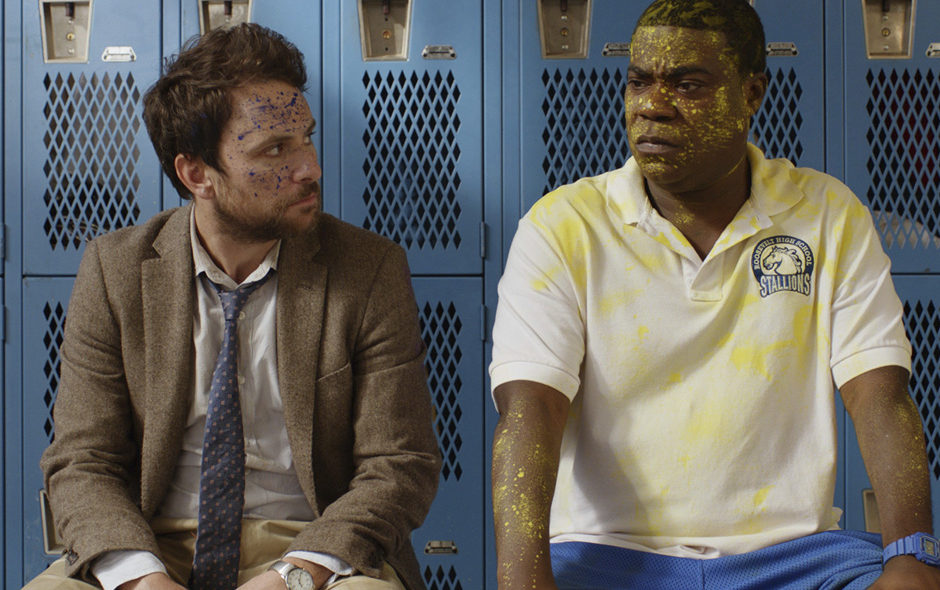Is Fist Fight a dumb comedy that proves the scratchy-voiced Charlie Day doesn’t deserve leading roles, or a revolutionary critique of the American school system? Perhaps it can be both – which doesn’t make it a good movie, necessarily, but at least it’s a comedy trying to say something.
Day plays Andy Campbell, a timorous teacher who inadvertently causes a fellow teacher to get fired. Unfortunately for Andy, the victim of his Nice White Guy dastardy is Strickland (Ice Cube), a hot-tempered colleague who screams at students and teachers alike and is clearly so badass the film doesn’t even give him a first name.
The only natural consequence in a movie such as this is for Strickland to challenge Andy to a good old-fashioned fist fight after school. The scrawny, spineless Andy is scared stiff but his every attempt to weasel out of the ass-kicking, like planting drugs on the African-American teacher, backfires.
As Andy’s professional and family life tensions mount throughout the day, the not-so-manly milquetoast takes a page out of Strickland’s book and sheds the Nice Guy image. Andy starts demanding, even barking for what he wants and ultimately faces off against a man twice his size and strength in a glorious match that finally earns him the respect of his peers and students.
The first half or more of Fist Fight establishes the wacky world of American public education, in which students are out of control and teachers are equally deranged. It’s the last day of the school year, also known as Senior Prank Day. Kids drug horses with meth and rig them with paint buckets to run around hallways; the principal’s car is vandalized; pictures of male genitals are secretly planted everywhere, from whiteboards to the football field.
The teachers, including pedophiliac Guidance Counsellor Holly (Jillian Bell), loud-mouthed Coach Crawford (Tracy Morgan) and the psychotic, knife-wielding Ms. Monet (Christina Hendricks) throw up their hands in despair at the chaos in their classrooms. The idea is that the teachers, all nervously awaiting to find out if they’ve been laid off, have only become this unstable because of the horrors of their workplace.
This conspicuous social commentary about classroom conditions comes to define what’s ultimately at stake in the eponymous fist fight. As Strickland – the only teacher who can control the juvenile delinquents – explains to Andy, he’s not interested in violence for the sake of it, but to set an example for kids and adults alike, to teach them that actions have consequences. And maybe, just maybe, the rabid media attention of seeing a wimpy white guy getting his ass kicked will shed some light on the anarchic, deprived conditions of the American public education system.
It’s a broad idea, but one that actually gives Fist Fight a certain gravitas (and totally fits in with Ice Cube’s on-brand “F—k the Police” sloganeering). Yet getting to the point where Andy self-actualizes and develops the courage to face Strickland’s fist is painful to watch, and the first half of the movie is so unwieldy it fails to deliver any punches at all. Day is simply not gifted enough to lead a comedy on his own – his awkward, what-world-am-I-living-in anxiety is not just lacklustre, it’s downright agonizing.
Each character is given exactly one personality trait: Andy is a coward; Strickland is angry; Crawford is really dumb, and so on. Instead of developing character arcs – such as fleshing out Andy and Strickland’s characters so we have a reason to root for one of them – Fist Fight devolves into boorish comedy caricatures and lazily asks us to laugh repeatedly at, for example, how funny it is for a woman to be attracted to teenage boys. For these reasons, Fist Fight fails to live up to its potential and gets nothing more than a barely passing grade.
Originally published in The National Post (February 17, 2017).

